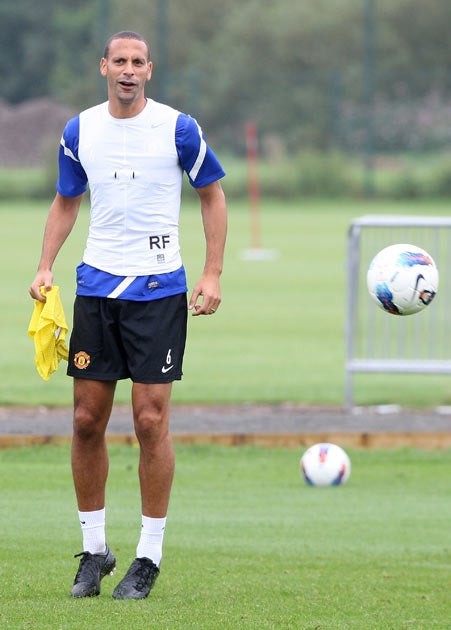Rio Ferdinand loses 'kiss and tell' bid

Your support helps us to tell the story
From reproductive rights to climate change to Big Tech, The Independent is on the ground when the story is developing. Whether it's investigating the financials of Elon Musk's pro-Trump PAC or producing our latest documentary, 'The A Word', which shines a light on the American women fighting for reproductive rights, we know how important it is to parse out the facts from the messaging.
At such a critical moment in US history, we need reporters on the ground. Your donation allows us to keep sending journalists to speak to both sides of the story.
The Independent is trusted by Americans across the entire political spectrum. And unlike many other quality news outlets, we choose not to lock Americans out of our reporting and analysis with paywalls. We believe quality journalism should be available to everyone, paid for by those who can afford it.
Your support makes all the difference.Rio Ferdinand lost his privacy action over a "kiss and tell" story today.
The England and Manchester United centre-back was not at London's High Court to hear Mr Justice Nicol dismiss his claim against MGN Ltd.
Ferdinand, 32, brought his case for misuse of private information over an April 2010 Sunday Mirror article in which interior designer Carly Storey gave her account of their 13-year relationship in return for £16,000.
The judge said: "Overall, in my judgment, the balancing exercise favours the defendant's right of freedom of expression over the claimant's right of privacy."
Ferdinand had branded the piece - "My affair with England captain Rio" - a "gross invasion of my privacy", and said he had not seen Ms Storey for six years by the time it appeared.
At a hearing in July, his lawyers asked for a maximum of £50,000 damages and a worldwide gagging order.
The article claimed Ferdinand, who has three children with wife Rebecca, ended the relationship within days of being handed the England skipper's armband in February 2010.
MGN said it was in the public interest to run the story about Ferdinand, who replaced John Terry as England captain before Terry was reinstated by manager Fabio Capello this year.
Its counsel, Gavin Millar QC, said Ferdinand was appointed England captain on the basis of being reformed and responsible.
In fact, as the article said, this was not the case.
He argued that the case was not really about Ferdinand's privacy but about the effect on the public image he had so painstakingly constructed, and was without merit.
Afterwards, Sunday Mirror editor Tina Weaver said in a statement: "The Sunday Mirror is very pleased that the court has rejected Rio Ferdinand's privacy claim.
"The judge found that there was a justified public interest in reporting the off-pitch behaviour of the then England captain and discussion of his suitability for such an important and ambassadorial role representing the country.
"We are pleased the judge ruled that Mr Ferdinand had perpetuated a misleading public image and the Sunday Mirror was entitled to correct this impression.
"There has never been greater scrutiny of the media than now, and we applaud this ruling in recognising the important role a free press has to play in a democratic society."
The judge refused Ferdinand permission to appeal, although he can renew his application directly to the Court of Appeal.
Pending any appeal moves he continued temporary orders preventing publication of any further details about the case which are not contained within today's public judgment.
Ferdinand now faces a costs bill unofficially estimated at around £500,000 with £100,000 to be paid to MGN within 14 days on account of its £161,000 costs.
In his ruling, Mr Justice Nicol said there was a public interest in the article.
"At one level it was a 'kiss and tell' story. Even less attractively, it was a 'kiss and paid for telling' story, but stories may be in the public interest even if the reasons behind the informant providing the information are less than noble."
He said that before 2006, Ferdinand seemed to have had "something of a wild reputation".
An interview which he gave to the News of the World in January 2006, in which he was portrayed as a reformed character, was significant, and this was followed by his autobiography and numerous other articles, in which the same theme was echoed.
A further factor was Ferdinand's appointment as captain.
"On the evidence presented in this case, it is by no means a universal view that the captain's role is confined to what happens on the pitch or what affects the players' performance."
Ferdinand, he added, had voluntarily assumed the role.
"It was a job that carried with it an expectation of high standards. In the views of many the captain was expected to maintain those standards off, as well as on, the pitch."
There were many who would indeed see the captain, at least, of the England football team as a "role model".
He went on: "During the course of the hearing I asked the parties whether it was incumbent on me to decide whether the claimant was fit to be England captain.
"Thankfully they agreed that it was not. The issue is rather whether the defendant's article reasonably contributed to the debate as to his suitability for that role."
PA
Join our commenting forum
Join thought-provoking conversations, follow other Independent readers and see their replies
Comments